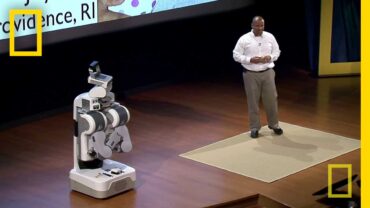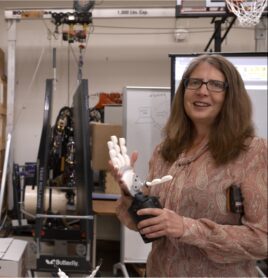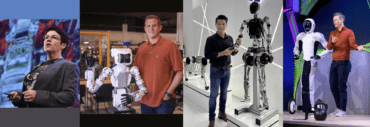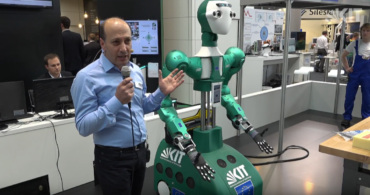Industry Panel
On Thursday afternoon, Jeff Cardenas, CEO of Apptronik, Zen Koh, CEO of Fourier Intelligence, and Bernt Øivind Børnich, CEO of 1X will deliver a panel moderated by Andra Keay, Director of Silicon Valley Robotics discussing the vision of humanoids for the near and long term in our industries and societies.
Odest Chadwicke Jenkins (Chad Jenkins)

Defining the Discipline of Robotics for Excellence and Equity through Bipedal Mobile Manipulation
Start with a simple question: What is the best degree program for a student to become a roboticist? In general, an undergraduate major defines the intellectual organization for its academic discipline to produce “people and ideas.” In my role leading the Robotics Undergraduate Program at Michigan, we tackled this question through the curricular challenge of how to both: 1) educate people to put ideas of the robotics discipline into practice and 2) endow them with the intellectual lens for creating new ideas that extend the frontiers of the robotics discipline – where mobility and manipulation through humanoid robots is poised to have a transformative impact on our world.
I will present the design, launch, and innovations for the Michigan Robotics Major and our research progress towards realizing humanoid mobile manipulation systems. Launched in 2022 as part of our larger Robotics Pathways model, the Michigan Robotics Major serves to enable successful and sustained career-long participation in robotics, AI, and automation professions. Building on our guiding principle of “Robotics with Respect” – the Michigan Robotics Major was designed to define robotics as a true academic discipline with both equity and excellence as our highest priorities. I will also present our research work for advancing perception and planning with the Agility Robotics Digit robot towards realizing the long-standing vision of taskable autonomous humanoid robots capable of mobile manipulation tasks in common human environments.
Chad Jenkins is a Professor of Robotics and a Professor of Electrical Engineering and Computer Science at the University of Michigan. He leads the Laboratory for Progress (Perceptive RObotics and Grounded REasoning Systems). Professor Jenkins is the inaugural Program Chair of the Robotics Major Degree Program launched in 2022 for undergraduates at the University of Michigan. Professor Jenkins is currently serving as Editor-in-Chief for the ACM Transactions on Human-Robot Interaction (ACM THRI), and is the incoming Vice President for Educational Activities of the IEEE Robotics and Automation Society. He is a Fellow of the American Association for the Advancement of Science (AAAS) and Association for the Advancement of Artificial Intelligence (AAAI).
Nancy Pollard

Bringing Dexterity to Robot Hands
Dexterous manipulation is one of our grand robotics challenges. Recent advances have brought this challenge into the spotlight but also highlight the large gap between robot and human capabilities. Why is there still a gap and how can we close it? In this talk, I will collect some of our observations from human studies, present my view of the major challenges, and talk about our efforts to address these challenges. The talk will consider these questions: (1) How should we measure (benchmark) dexterity? (2) How should we manage contact and the evolution of contact during manipulation? and (3) How should we design robot hands for dexterous manipulation? I will show some of the hands my group has built over the past six years and talk about their strengths, their weaknesses, and my vision for the future.
Nancy Pollard is a Professor in the Robotics Institute and the Computer Science Department at Carnegie Mellon University. She received her PhD in Electrical Engineering and Computer Science from the MIT Artificial Intelligence Laboratory in 1994, where she performed research on grasp planning for dexterous robot hands. She received the NSF CAREER award for research on “Quantifying Humanlike Enveloping Grasps” and the Okawa Research Grant for “Studies of Dexterity for Computer Graphics and Robotics.” She founded the course “Hands: Design and Control for Dexterous Manipulation,” at Carnegie Mellon and has been teaching this course since 2010. Her research goal is to understand human dexterity and create dexterous behavior in robots. She has led the development of several generations of dexterous soft robotic hands and leads the CMU Foam Hands Laboratory.
Tamim Asfour
Humanoid Robots: Creating 24/7 Functional Intelligence for Personal Assistance
Research in humanoid robotics strives to create versatile machines endowed with functional intelligence, i.e. the abilities to reason and act in the physical world and to perform any task that a human might reasonably be expected to carry out. The era of humanoid robots acting in the real world as general-purpose machines with functional intelligence is dawning. Substantial advances have been made, positioning humanoid robotics as a cornerstone in both robotics research and understanding intelligence. In this talk, I will discuss progress towards 24/7 humanoid robots for empowering and assisting humans in daily life. I will specifically focus on learning from human and natural interaction, on performing complex manipulation tasks, and on engineering holistic systems with architectures integrating semantic representations and sensorimotor control. I will conclude with a discussion of the major challenges and the transformative impact humanoid robotics will have in the future.
Tamim Asfour is a full Professor of Humanoid Robotics and the Director of the High-Performance Humanoid Technologies Lab (H2T) of the Institute of Anthropomatics and Robotics at the Karlsruhe Institute of Technology (KIT), Germany. His research focuses on the engineering 24/7 humanoid robotics. In particular, he studies the mechano-informatics of humanoids as the synergetic integration of informatics, artificial intelligence, and mechatronics into complete humanoid robot systems, which learn from humans, experience, and interact with the environment to perform versatile tasks in the real world. Tamim is the developer of the ARMAR humanoid robot family. He has been a visiting professor at Georgia Tech, at the Tokyo University of Agriculture and Technology, and at the National University of Singapore. He is the Editor-in-Chief of the Robotics and Automation Letters (RA-L), the Founding Editor-in-Chief of the IEEE-RAS Humanoids Conference Editorial Board, the president of the Executive Board of the German Robotics Society (DGR), and the scientific spokesperson of the KIT Center “Information · Systems · Technologies” (KCIST).



